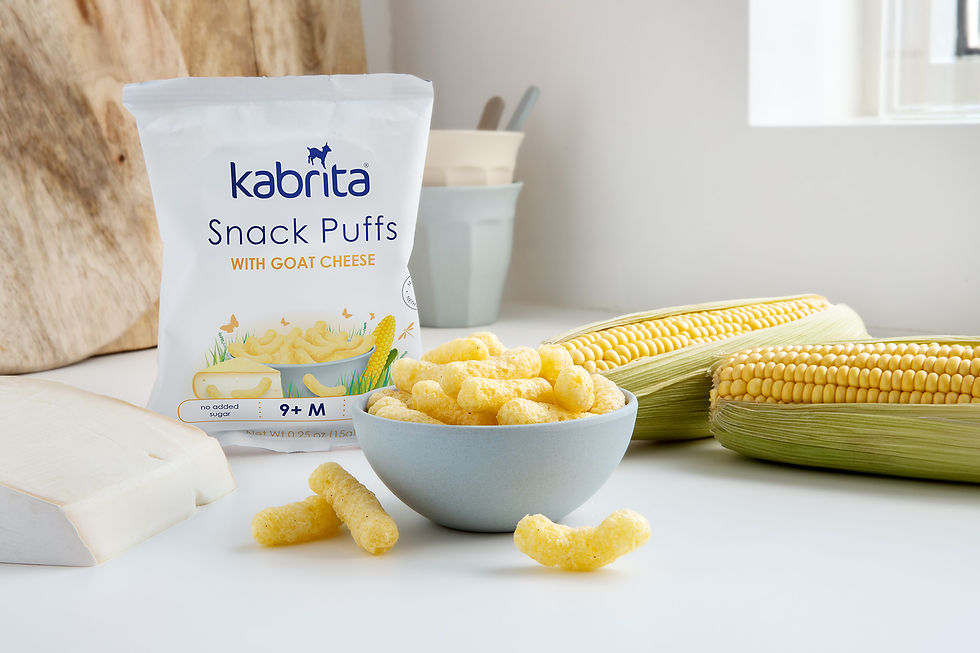Food Facts | Goat Cheese
- Anni Weeks, NDTR

- Aug 8, 2022
- 2 min read
Curious about goat cheese? Find out all the food facts you need to know here!

Disclaimer: This post includes affiliate links, which may provide me a small commission for each sale. This allows me to keep providing helpful resources (such as this post). All opinions expressed are my own.
Goat Cheese
fromage de chèvre
Goat cheese was once thought to be “hippie food.” Now, it symbolizes a farm-fresh flavor, and is often a feature of upscale salads and other dishes. The good news? You can also find it at your local supermarket and use it to elevate your everyday meals.
Nutrition:
Per one ounce:
Calories- 103
Fat- 8 grams (6 grams being saturated fats)
Protein- 6 grams
Although goat cheese contains 0 carbohydrates, it does contain calcium, copper, iron, and magnesium. It also contains the following vitamins:
Vitamin B2 (Riboflavin)
Vitamin B3 (Niacin)
Some types of goat cheese also contain probiotics, which have been shown to promote gut health.
Allergic Reaction : While lactose intolerant individuals should beware, goats cheese is actually easier to digest and maybe okay for some to consume.
In Season: Year-round; production traditionally peaks during spring or summer

A Brief History
As one of the first domesticated animals, goats were originally farmed for meat and then eventually milked. Historically, farmers would store the milk in makeshift jugs or pouches.
As they traveled, this milk would churn into butter and become an on-the-go snack! This is actually considered an accidental discovery by many historians and was thought to inspire the milking of other animals (i.e. sheep, cows, water buffalo).
How To
Pick Good Goat Cheese
Goats cheese comes in many varieties. Like cheese from cow’s milk, an exceptional variety will likely be from local artisans who have honed their craft.
Just like cow’s milk, you can get popular varieties like cheddar or Brie made from goat milk instead. Goat cheese is also available in popular packaging methods, such as a cheese log.
Popular forms of goat cheese include:
Aged goat cheese
Chèvre
Goat feta
Soft ripened
Store Goat Cheese
Fridge
Vacuum-sealed (unopened)- up to 2 months
Opened- 5-7 days
Plastic Wrap
Not recommended (breathability maintains flavor and extends shelf life)
Recommendations
Use resealable container
Eat Goat Cheese
Enjoy it in the place of cream cheese on your breakfast bagel
Add it to a cheese platter with crackers
Blend with cream cheese to cut the calories, fat, and cholesterol in half
Top a pizza or flatbread with it
Mix it into your quiche, frittata, or omelet
Use it in the base of a sauce
Layer it in a mini tart
Crumble atop a salad
Add it to your avocado toast
Top cooked oatmeal with it
Use it in a potato recipe for unique flavors
Experiment: Freeze your goat cheese! Since it is already aged, it can be preserved even further by putting it in the freezer until it is ready to be enjoyed.

Fun Fact: The country of France produces the most goat cheese, with a 45% share of the market.
Recommended Product
References
GRACE Communications Foundation. Real Food Encyclopedia | Goat Cheese. Foodprint.org. Accessed 2022.
Kubula J. Goat Cheese: Nutrition, Benefits and Recipe Ideas. Healthline.com. Published July 2018.
Market Growth Reports. Global Goat Cheese Market Outlook 2022. Marketgrowthreports.com. Accessed 2022.
Martin P. Any Goat Cheese Lovers Out There? Pattyrd.com. Published June 2021.
U. S. Department of Agriculture. FoodData Search Results. Fdc.nal.usda.gov. Accessed 2022.





Comments